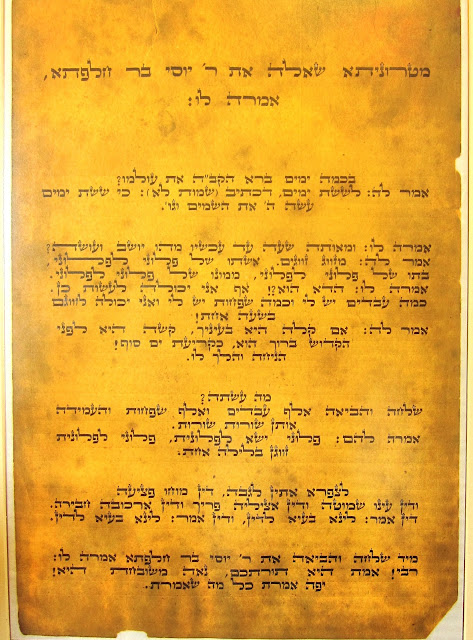A Roman lady asked R. Jose b. Halafta: ‘In
how many days did the Holy One, blessed be He, create His world”’ He answered: ‘In six days, as
it is written, For in six days the Lord made heaven and
earth,
etc.(Ex. XXXI, 17). She asked further: ‘And
what has He been doing since that time?’
He answered: ‘He is joining couples [proclaiming]:
“A’s wife [to be] is allotted to A; A’s daughter is allotted to B; (So-and-so’s
wealth is for So-and-so).”’ Said
she:
‘This is a thing which I, too, am able to do.
See how many male slaves and how many female slaves I have; I can make
them consort together all at the same time.’
Said he: ‘If in your eyes it is an easy task, it is
in His eyes as hard a task as the dividing of the Red Sea.’ He
then went away and left her. What did
she do? She sent for a thousand male
slaves and a thousand female slaves, placed them in rows, and said to them:
‘Male A shall take to wife female B; C shall take D and so on.’ She let them consort together one night. In the morning they came to her; one had a
head wounded, another had an eye taken out, another an elbow crushed, another a
leg broken; one said ‘I do not want this one [as my husband],’ another said: ‘I
do not want this one [as my wife].’
Midrash
Rabbah
(VaYikra
Rabbah)
Translated into English under the
editorship of Rabbi Dr. H. Freedman, and Maurice Simon,
Leviticus, Chapters I-XIX translated by
Rev. J. Israelstam, Soncino
Press, London, 1939
Chapter VIII (TZAV)
And if empirical evidence is needed that some marriages are arranged in heaven, consider the wedding this evening of Dvorah Marciano and Assaf Romm in Jerusalem, and the upcoming weddings of Ilana Turko and Judd Kessler on Shelter Island, and Theresa Morin and Brian Hall on Little Cranberry Island, and a little further ahead of Coren Apicella and Eduardo Azevedo, and Katie Baldiga and Luke Coffman. (Not to mention lots of anniversaries that come to mind, including Emilie's and my recent 35th:). It appears that economists are also into matching...)
***************
Update (from Jacob Leshno): here is the line by line translation...
|
מטרוניתא שאלה את ר'
יוסי בר חלפתא,
אמרה לו:
|
A Roman lady asked R. Jose b. Halafta:
|
|
בכמה ימים ברא הקב"ה
את עולמו?
|
‘In how many days did the Holy One,
blessed be He, create His World?” |
|
אמר לה: לששת ימים,
דכתיב (שמות לא): כי ששת ימים
עשה ה' את השמים וגו'.
|
He answered: ‘In six days, as it is
written, For in six days the Lord made heaven and earth, etc.’
|
|
אמרה לו: ומאותה שעה עד עכשיו
מהו יושב ועושה?
|
She asked further: ‘And what has He been
doing since that time?’
|
|
אמר לה: מזווג זווגים.
אשתו של פלוני לפלוני,
|
He answered: ‘He is joining couples:
“A’s wife [to be allotted] to A;
|
|
בתו של פלוני לפלוני,
ממונו של פלוני לפלוני.
|
A’s daughter is allotted to B;
(so-and-so’s wealth is for so-and-so).”
|
|
אמרה לו: הדא הוא?!
אף אני יכולה לעשות כן.
כמה עבדים יש לי וכמה שפחות יש לי ואני יכולה לזווגם
בשעה אחת!
|
Said she: ‘This is a thing which I, too, am able to
do.
See how many male slaves and how many female slaves I have; I can make them consort together all at the same time.’ |
|
אמר לה: אם קלה היא
בעיניך, קשה היא לפני
הקדוש ברוך הוא, כקריעת
ים סוף!
|
Said he: ‘If in your eyes it is an easy
task, it is in His eyes as hard a task as the dividing of the Red Sea.’
|
|
הניחה והלך לו.
|
He then went away and left her.
|
|
מה עשתה?
|
What did she do?
|
|
שלחה והביאה אלף עבדים ואלף
שפחות והעמידה
אותן שורות שורות.
|
She
sent for a thousand male slaves and a thousand female slaves, placed them in
rows
|
|
אמרה להם: פלוני ישא
לפלונית, פלוני לפלונית,
זווגן בלילה אחת. |
, and said to them: ‘Male A shall take
to wife female B; C shall take D and so on
She let them consort together one night.
|
|
לצפרא אתין לגבה, דין
מוחו פציעה
ודין עינו שמוטה
ודין אציליה פריך ודין ארכובה חבירה.
|
In the morning they came to her;
one had a head wounded, another had an
eye taken out, another an elbow crushed,
another a leg broken;
|
|
דין אמר: לינא בעיא
לדין, ודין אמר: לינא בעיא לדין.
|
one said: ‘I do not want this one,’
another said: ‘I do not want this one
|
|
מיד שלחה והביאה את
ר' יוסי בר חלפתא אמרה לו:
רבי! אמת היא תורתכם, נאה משובחת היא! |
Immediately she sent for Rabi Jose b.
Halafta, told him:
Rabi! True is your wisdom and fair it is
|
|
יפה אמרת כל מה שאמרת.
|
Well
said all that you have spoken
|



